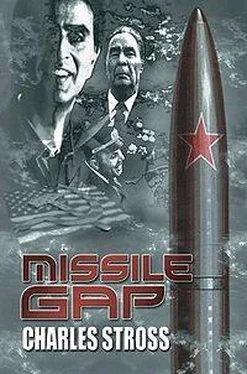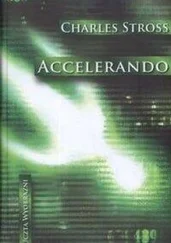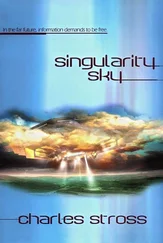At the end of its mission, the NP-101 drops its final film capsule and flies out into the middle of an uninhabited ocean, to ditch its spent nuclear reactor safely far from home.
Cut to:
A bull's-eye diagram. The centre is a black circle with a star at its heart; around it is a circular platter, of roughly the same proportions as a 45 rpm single.
Voice over:
A rough map of the disk. Here is the area we have explored to date, using the NP-101 program.
(A dot little larger than a sand grain lights up on the face of the single.)
That dot of light is a million kilometers in radius — five times the distance that used to separate our old Earth from its moon. (To cross the radius of the disk, an NP-101 would have to fly at Mach Three for almost ten years.) We aren't even sure exactly where the centre of that dot lies on the disk: our highest sounding rocket, the Nova-Orion block two, can barely rise two degrees above the plane of the disk before crashing back again. Here is the scope of our knowledge of our surroundings, derived from the continental-scale mapping cameras carried by Project Orion:
(A salmon pink area almost half an inch in diameter lights up around the red sand grain on the face of the single.)
Of course, cameras at an altitude of a hundred thousand miles can't look down on new continents and discern signs of Communist infiltration; at best they can listen for radio transmissions and perform spectroscopic analyses of the atmospheric gasses above distant lands, looking for gasses characteristic of industrial development such as chlorofluorocarbons and nitrogen oxides.
This leaves us vulnerable to unpleasant surprises. Our long term strategic analyses imply that we are almost certainly not alone on the disk. In addition to the Communists, we must consider the possibility that whoever build this monstrous structure — clearly one of the wonders of the universe — might also live here. We must contemplate their motives for bringing us to this place. And then there are the aboriginal cultures discovered on continents F-29 and F-364, both now placed under quarantine. If some land masses bear aboriginal inhabitants, we may speculate that they, too, have been transported to the disk in the same manner as ourselves, for some as-yet unknown purpose. It is possible that they are genuine stone-age dwellers — or that they are the survivors of advanced civilizations that did not survive the transition to this environment. What is the possibility that there exists on the disk one or more advanced alien civilizations that are larger and more powerful than our own? And would we recognize them as such if we saw them? How can we go about estimating the risk of our encountering hostile Little Green Men — now that other worlds are in range of even a well-equipped sailboat, much less the Savannah-class nuclear powered exploration ships? Astronomers Carl Sagan and Daniel Drake estimate the probability as high — so high, in fact, that they believe there are several such civilizations out there.
We are not alone. We can only speculate about why we might have been brought here by the abductors, but we can be certain that it is only a matter of time before we encounter an advanced alien civilization that may well be hostile to us. This briefing film will now continue with an overview of our strategic preparations for first contact, and the scenarios within which we envisage this contingency arising, with specific reference to the Soviet Union as an example of an unfriendly ideological superpower…
Chapter Eight: Tenure Track
After two weeks, Maddy is sure she's going mad.
She and Bob have been assigned a small prefabricated house (not much more than a shack, although it has electricity and running water) on the edge of town. He's been drafted into residential works, put to work erecting more buildings: and this is the nearest thing to a success they've had, because after a carefully-controlled protest his status has been corrected, from just another set of unskilled hands to trainee surveyor. A promotion of which he is terribly proud, evidently taking it as confirmation that they've made the right move by coming here.
Maddy, meanwhile, has a harder time finding work. The district hospital is fully staffed. They don't need her, won't need her until the next shipload of settlers arrive, unless she wants to pack up her bags and go tramping around isolated ranch settlements in the outback. In a year's time the governor has decreed they'll establish another town-scale settlement, inland near the mining encampments on the edge of the Hoover Desert. Then they'll need medics to staff the new hospital: but for now, she's a spare wheel. Because Maddy is a city girl by upbringing and disposition, and not inclined to take a job tramping around the outback if she can avoid it.
She spends the first week and then much of the second mooching around town, trying to find out what she can do. She's not the only young woman in this predicament. While there's officially no unemployment, and the colony's dirigiste administration finds plenty of hard work for idle hands, there's also a lack of openings for ambulance crew, or indeed much of anything else she can do. Career-wise it's like a trip into the 1950's. Young, female, and ambitious? Lots of occupations simply don't exist out here on the fringe, and many others are closed or inaccessible. Everywhere she looks she sees mothers shepherding implausibly large flocks of toddlers their guardians pinch-faced from worry and exhaustion. Bob wants kids, although Maddy's not ready for that yet. But the alternatives on offer are limited.
Eventually Maddy takes to going through the "help wanted" ads on the bulletin board outside city hall. Some of them are legit: and at least a few are downright peculiar. One catches her eye: field assistant wanted for biological research. I wonder? she thinks, and goes in search of a door to bang on.
When she finds the door — raw wood, just beginning to bleach in the strong colonial sunlight — and bangs on it, John Martin opens it and blinks quizzically into the light. "Hello?" he asks.
"You were advertising for a field assistant?" She stares at him. He's the entomologist, right? She remembers his hands on the telescope on the deck of the ship. The voyage itself is already taking on the false patina of romance in her memories, compared to the dusty present it has delivered her to.
"I was? Oh — yes, yes. Do come in." He backs into the house — another of these identikit shacks, colonial, family, for the use of — and offers her a seat in what used to be the living room. It's almost completely filled by a work table and a desk and a tall wooden chest of sample drawers. There's an odd, musty smell, like old cobwebs and leaky demijohns of formalin. John shuffles around his den, vaguely disordered by the unexpected shock of company. There's something touchingly cute about him, like the subjects of his studies, Maddy thinks. "Sorry about the mess, I don't get many visitors. So, um, do you have any relevant experience?"
She doesn't hesitate: "None whatsoever, but I'd like to learn." She leans forward. "I qualified as a paramedic before we left. At college I was studying biology, but I had to drop out midway through my second year: I was thinking about going to medical school later, but I guess that's not going to happen here. Anyway, the hospital here has no vacancies, so I need to find something else to do. What exactly does a field assistant get up to?"
"Get sore feet." He grins lopsidedly. "Did you do any lab time? Field work?" Maddy nods hesitantly so he drags her meager college experiences out of her before he continues. "I've got a whole continent to explore and only one set of hands: we're spread thin out here. Luckily NSF budgeted to hire me an assistant. The assistant's job is to be my Man Friday; to help me cart equipment about, take samples, help with basic lab work — very basic — and so on. Oh, and if they're interested in entomology, botany, or anything else remotely relevant that's a plus. There aren't many unemployed life sciences people around here, funnily enough: have you had any chemistry?"
Читать дальше












